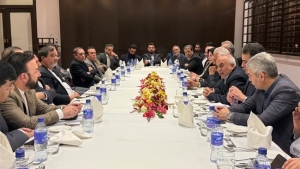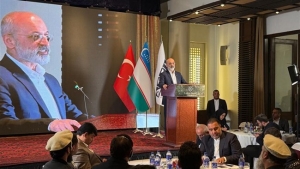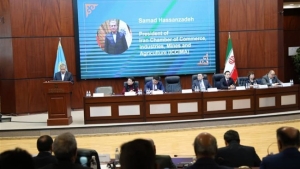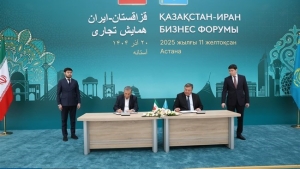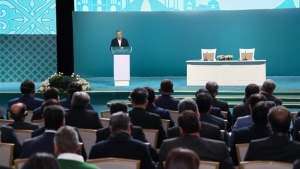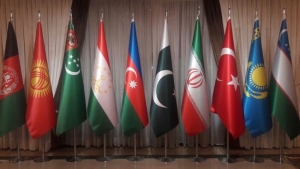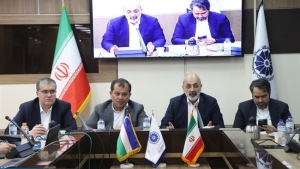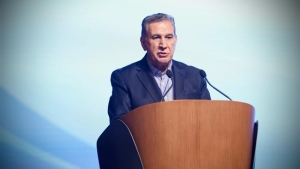Member Countries
ecocci
ECO‑Region & Related Exhibitions – Exhibitor Information 2026
Eco Expo Central Asia 2026 – Samarkand, Uzbekistan
Dates: 31 May – 2 June 2026
Venue: EXPO CENTER, Silk Road Samarkand, Uzbekistan
Organizer & Contact:
-
BUSINESS CONGRESS MANAGEMENT CORP LLC FE
-
Email: This email address is being protected from spambots. You need JavaScript enabled to view it.
-
Phone: +998 94 990 37 95
Exhibitor Stand & Registration:
-
You must book a stand in advance by contacting the organizer.
-
Direct booking contact is available on the official site.
Opportunities:
✔ Standard booths and partnership/ad packages available.
✔ Advertising and visibility packages beyond booth space (brand highlights, sponsorship etc.).
Notes:
-
Detailed pricing is not published on the public site — interested companies must contact organizers directly for quotes and deadlines.
-
Early booking increases chances of choice locations and partnership options.
Regional Environmental Summit & Expo 2026 – Astana, Kazakhstan
Dates: 22–24 April 2026
Venue: International Exhibition Center “EXPO”, Astana
Event Focus:
Energy, water tech, circular economy, smart cities and climate technologies.
Participation:
-
Company booths and stand spaces available directly on the event site.
-
Official contact for booking a stand is listed by the organizers.
-
Over 200 exhibiting companies expected from ~30 countries.
Why important:
✔ Strong B2B and B2G networking with regional governments and investors.
✔ Useful for Iranian companies in sustainable technologies, energy, water systems, and smart infrastructure sectors.
Industrial & Central Asian Regional Trade Fairs (Example: INNOPROM‑style & others)
Although not ECO‑branded, industrial, technology or manufacturing expos in Central Asia / Eurasia attract companies from all ECO member states and often have structured exhibitor information:
Typical Terms (Based on similar trade fair models):
✔ Registration Fee: ~US$440 per exhibitor/co‑exhibitor.
✔ Minimum Booth Space: 9 m² standard.
✔ Service Pack Price: ~US$410/m² if paid before deadline (~31 Dec 2025), rising to ~US$460/m² after.
✔ Badges:
-
~1 badge per 5 m² space.
-
Extra badge ~US$35 each.
Example participation format from a Central Asia industrial trade fair:
-
Standard booth and bare space options.
-
Extra corner booth charges (~15%).
-
Option to participate in business programs and roundtables (fees vary).
Note: This pricing is representative and may vary by specific event or organizer — always confirm with organizers.
Major ECO & Regional Economic Events in 2026 (All Member Countries)
1. ECO CCI Executive & General Assembly Meetings
The Economic Cooperation Organization Chambers of Commerce and Industry (ECO CCI) holds annual executive meetings and assemblies for planning trade cooperation, harmonization of standards, and private sector integration across all member states.
-
These typically occur early in the year (January–February).
-
Focus: trade policy dialogue, membership coordination, and business matching across ECO countries.
(Formal schedules are published by ECO CCI events platform.)
Key purpose: Strengthening private sector cooperation and trade facilitation among all ECO members.
2. Eco Expo Central Asia 2026
- Samarkand, Uzbekistan
- 31 May – 2 June 2026
This will be one of the largest international expos in Central Asia — showcasing environmental technologies, sustainable innovation, and green business solutions, and drawing participants from across ECO member states and beyond.
Highlighted sectors include:
-
Green construction and sustainable infrastructure
-
Clean tech and eco‑innovation
-
Green transport and smart cities
-
Sustainable agriculture
-
Green finance and eco‑tourism
Trade relevance: While focused on environment and sustainability, this expo offers B2B, B2G networking and export opportunities for Iranian firms in technologies, machinery, energy, and environmental solutions, as well as services in the ECO region.
3. Regional Environmental Summit & Expo 2026 – Astana
- Astana, Kazakhstan
- 22–24 April 2026
Although broader in theme, this expo gathers government, business and innovation leaders from 30+ countries, including ECO members, around green technology, smart infrastructure, water and climate solutions.
Trade relevance:
-
B2B and B2G negotiations
-
Networking with international investors
-
Investment and export opportunities in sustainable technologies.
4. ECO Business Week & Eco Business Forums
Large, cross‑sectoral ECO business platforms that bring government officials, private sector leaders and chambers of commerce together, in formats such as:
-
ECO Business Week
-
ECO Business Forums
-
Sector‑specific B2B meetings
Example: The 6th ECO Business Forum held in Shusha, Azerbaijan (in 2025) highlighted trade, investment, and cooperation in food, agriculture, textiles, ICT, transport, tourism, and circular economy. These frameworks typically produce follow‑on initiatives influencing the 2026 agenda.
Key purpose: Strategic trade cooperation, export promotion and regional economic integration across ECO members.
5. ECO Ministerial & Sectoral Meetings (e.g., Tourism, Transport)
Networking and cooperative decision‑making events among ministers and delegates of all ECO member states focusing on sectors relevant to customs and trade logistics.
Example: The ECO Tourism Ministerial Meeting signals sectoral dialogue within ECO frameworks with potential indirect trade logistics impacts.
ECO Member Countries Involved
All events listed include participation (directly or indirectly) from ECO member countries:
- Iran
- Turkey
- Pakistan
- Azerbaijan
- Uzbekistan
- Kazakhstan
- Turkmenistan
- Afghanistan
- Kyrgyzstan
- Tajikistan
(Plus observer states and associate partners at larger forums.)
Why These 2026 Events Matter for Trade & Customs
Export Expansion
-
Platforms like Eco Expo Central Asia 2026 and ECO Business Forums provide Iranian exporters with direct access to buyers and partners across ECO markets — for industrial, tech, and green sector products.
Import & Supply Chain Insights
-
Exposure to regional suppliers and technologies facilitates import planning, tariff negotiations, and strategic sourcing for Iranian markets.
Networking & B2B Opportunities
-
Business matchmaking sessions, seminars, and official dialogues help customs authorities and trade delegations coordinate export documentation, logistics pathways, and regulatory frameworks.
Trade Policy & Facilitation
-
Meetings of ECO CCI and ministerial panels contribute to harmonizing trade procedures, easing cross‑border movement of goods, and aligning standards among member states.
Afghanistan urges major Iranian firms to step up investment
Afghanistan Chamber of Commerce and Investment has called on major Iranian companies to increase their presence in the country, saying Iran’s private sector is underrepresented compared with investors from other nations.
The appeal was made during a meeting between a visiting delegation from Iran Chamber of Commerce and the president of Afghanistan Chamber of Commerce and Investment in Kabul on Sunday.
The two sides reviewed three priority areas for bilateral cooperation – investment, exports and transport – noting that both countries have struggled to build steady, long-term partnerships in these sectors.
Afghan officials said foreign companies from several countries have already stepped up investment in Afghanistan, but Iran’s footprint remains limited.
Niloofar Asadi, Asia-Oceania director at the international affairs department of Iran Chamber of Commerce, said expanding ties with Afghanistan is a top priority and that Iran is drafting a roadmap aimed at raising the level of economic engagement.
She stressed the need to make better use of joint chambers and to strengthen participation in bilateral commissions to help remove legal barriers and support the development of essential infrastructure.
Iran chamber official sees promising trade outlook with Afghanistan
A senior Iranian business leader says trade prospects between Iran and Afghanistan are “bright and promising,” calling for faster progress on joint projects and improved border and financial infrastructure to deepen economic ties.
Speaking at a multilateral business forum held alongside the fourth Imam Abu Hanifa International Exhibition in Kabul on Wednesday, Qadir Qiafeh, vice-president of Iran Chamber of Commerce, said Afghanistan’s mineral wealth, fertile land, emerging industrial potential and young workforce complemented Iran’s advanced industrial base, technical expertise and access to global markets.
He said the Iranian chamber aims to play “a central and active role” in facilitating long-term partnerships between private-sector players in both countries.
Qiafeh outlined several priority steps to boost cooperation, starting with accelerating joint projects, particularly completion and operationalization of all phases of the Khaf-Herat railway, which he said would significantly increase bilateral trade capacity.
He also called for improved payment channels and resolution of banking issues, including blocked accounts, which continue to hinder transactions. Strengthening infrastructure at the Dogharoun border crossing and reducing delays at the frontier were essential for expanding trade, he added.
Qiafeh said Iran and Afghanistan could jointly develop agricultural supply and processing, noting Afghanistan’s water resources and production potential. He said part of Iran’s agricultural needs could be sourced from Afghanistan and, after processing, exported to international markets.
Iran Chamber chief calls for upgrade of Kazakhstan ties to strategic economic partnership
Iran Chamber of Commerce president says it is time for Tehran and Astana to move beyond traditional trade and pursue a strategic industrial and transit partnership, adding that the Iranian private sector was ready to turn negotiations into concrete projects and lasting regional cooperation.
Speaking at an Iran-Kazakhstan trade and economic seminar in Astana on Wednesday, Samad Hassanzadeh said Kazakhstan’s economy – with a GDP of more than $288 billion – makes it a key partner for Iran in Eurasia, though current trade levels fall far short of potential.
Hassanzadeh said removing existing barriers could lift trade to $3 billion and that the newly implemented Iran-Eurasia free trade agreement, which eliminates a large share of tariffs, will help cut transaction costs and open new routes. He said the deal offers Kazakhstan a “golden opportunity” to connect to Persian Gulf, South Asian, African and even European markets through Iran, while enabling Iran to become a distribution hub in Central Asia.
He outlined key proposals for deeper cooperation, including a joint Iran-Kazakhstan logistics terminal in southern Iranian ports, joint grain, meat and oil processing units, and a shared industrial zone in Iran’s free trade areas for exports to Eurasia.
He also called for a joint consortium to process Kazakh minerals in Iran for higher-value exports to third countries.
Hassanzadeh said the moment had come to elevate ties to a strategic economic, industrial and transit partnership, adding that Iran Chamber of Commerce stood ready to transform understandings into investments and long-term regional collaboration.
Iran, Kazakhstan private sectors sign nine cooperation documents
Private sector representatives from Iran and Kazakhstan signed nine cooperation documents during a visit by a large Iranian trade delegation to the Kazakh capital Astana.
A 100-member delegation from Iran Chamber of Commerce, Industries, Mines and Agriculture, led by its president Samad Hassanzadeh, returned to Tehran after the trip, which coincided with an official visit by President Masoud Pezeshkian to Kazakhstan.
During the visit, the Iranian chamber signed three memorandums of understanding with KazTrade, Kazakhstan’s Trade Development Council, and the National Chamber of Entrepreneurs of Kazakhstan, known as Atameken. The agreements focus on cooperation in exchanging trade information, facilitating the exchange of business delegations, logistics, and green transportation of goods.
Several Iranian companies also signed six cooperation agreements with their Kazakh counterparts in sectors including agricultural exports, mining, copper production and the food industry.
Iran chamber chief says bilateral trade with Kazakhstan could multiply with better infrastructure
Iran chamber of commerce president said on Thursday that bilateral trade with Kazakhstan, currently estimated at about $350 million, could rise several-fold in the short term if existing logistical and financial bottlenecks are addressed.
Speaking at the Iran-Kazakhstan Business Forum held in Astana and attended by the presidents of both countries, Samad Hassanzadeh said studies show that inadequate transport and logistics infrastructure, the absence of a joint bank and reliable financial mechanisms, and competition from regional products in Kazakhstan remain major obstacles.
“Removing these barriers requires joint planning, government support and the active involvement of the private sector,” he said.
Hassanzadeh highlighted the International North-South Transport Corridor (INSTC) as a key platform for cooperation, saying the route – which passes through Iran and connects to the port of Bandar Abbas – provides Kazakhstan and other CIS countries with access to the Persian Gulf and markets in South and East Asia.
He said expanding the corridor would cut transportation costs and play a vital role in strengthening regional food security, energy links and trade. “Completing the infrastructure of this corridor and resolving its operational challenges must be a priority in our joint cooperation,” he added.
Hassanzadeh said Kazakhstan is a top strategic partner for Iran due to geographical proximity, shared interests and its membership in the Eurasian Economic Union, and that Iran Chamber of Commerce stands ready to take practical steps to deepen economic ties.
Iran’s last year trade with ECO countries hits $27.6 billion
Iran’s trade with member states of the Economic Cooperation Organization (ECO) reached $27.6 billion in the past calendar year to late March with a total trade volume of 36.2 million tonnes, according to figures released by Iran’s Customs Administration.
Of this amount, exports accounted for 28 million tonnes valued at $14.08 billion, while imports totaled 8.2 million tonnes worth $13.54 billion.
Non-oil exports to ECO countries saw strong growth, rising 38.7% in volume and 37.5% in value year-on-year. Imports from ECO partners also increased, up 36% in volume and 54.5% in value compared to the previous year.
Turkey was the top destination for Iranian non-oil exports, receiving goods worth $6.89 billion. Other key markets included Pakistan ($2.42 billion), Afghanistan ($2.41 billion), Azerbaijan ($681 million), and Turkmenistan ($572 million).
On the import side, Turkey also led the list, exporting $12.47 billion worth of goods to Iran. Pakistan followed with $706 million, and Tajikistan with $93 million.
Iran, Uzbekistan seek to deepen trade ties as business delegation visits Tehran
The Iran Chamber of Commerce, Industries, Mines, and Agriculture hosted a high-level business delegation from Uzbekistan on Wednesday, led by Davron Vakhabov, president of the country’s Chamber of Commerce and Industry, as both nations seek to expand economic cooperation.
Qadir Qiafeh, Vice President of the Iran Chamber of Commerce, welcomed the Uzbek delegation and expressed optimism that recent positive developments in both countries could lead to enhanced collaboration in industrial, commercial, and technological sectors.
Highlighting Uzbekistan’s strong presence at the upcoming Iran Expo, Qiafeh said: “With 200 Uzbek companies participating, we will certainly organize a side event during Iran Expo to facilitate direct engagement between Iranian and Uzbek business representatives so they can identify potential partners.”
Vakhabov noted that trade ties between Iran and Uzbekistan have grown in recent years, though he stressed that the full potential of bilateral cooperation remains untapped.
“With stronger cooperation between our chambers of commerce and private sectors, and the resolution of trade barriers by our governments, we believe bilateral trade could reach $5 billion by 2028,” he said.
Vakhabov emphasized Uzbekistan’s strategic role as a hub for manufacturing and re-exporting finished goods to third countries, adding that raw materials from Iran could be vital to fueling this growth.
Mousa Aghaei, Chairman of the Iran-Uzbekistan Joint Chamber of Commerce, echoed the need to elevate bilateral trade volumes, saying current figures do not reflect the depth of historical, cultural, and economic ties between the two nations.
Aghaei also called on banks in both countries to draw on their experience and consult with traders to devise solutions for easing financial transactions. He noted that Uzbekistan's exports to Iran suffer from a lack of diversity and said the joint chamber is ready to help promote Uzbek capabilities in the Iranian market.
He concluded by urging Uzbekistan to ease its visa policy for Iranian nationals, stating that the ultimate goal should be full visa exemption.
Iran eyes multi-billion-dollar trade with Azerbaijan: Chamber of Commerce president
Iran aims to significantly boost trade with neighboring Azerbaijan in the coming years, building on a 2024 trade volume of around $900 million, the president of Iran Chamber of Commerce, Industries, Mines and Agriculture said at a bilateral business forum attended by the presidents of both countries.
Speaking at the Iran-Azerbaijan Business Forum in Baku on Monday, Samad Hassanzadeh expressed optimism about deepening economic ties between Tehran and Baku.
"Our goal is to increase the volume of trade to several billion dollars in the coming years," Hassanzadeh said. "This forum should mark a new chapter in strengthening our brotherly relations and expanding joint economic cooperation."
He said Iran’s private sector and business leaders were fully prepared to explore investment and joint production opportunities with Azerbaijani partners.
Hassanzadeh outlined key sectors for collaboration, highlighting transit and transport, particularly the completion of the Rasht–Astara railway—a missing link in the International North–South Transport Corridor (INSTC). The project would reduce shipment times between Asia and Europe and enhance both countries' roles in the global supply chain, he said.
In the energy sector, he pointed to recent tripartite gas swap agreements between Iran, Azerbaijan and Turkmenistan, which have laid the groundwork for expanded cooperation in electricity and gas trade. Joint investments in cross-border energy infrastructure and power plant projects were described as unprecedented opportunities.
Hassanzadeh also emphasized collaboration in agriculture and food industries, including smart farming technologies, greenhouse production, modern irrigation, and exports of processed agricultural products.
Following Azerbaijan’s reclaiming of its territories, he said Iranian firms could play a major role in reconstruction, including in road building, dam construction, electrification, and building hospitals and schools.
Hassanzadeh also identified tourism – especially health, religious, and eco-tourism – as another promising area, citing eased visa regulations and cultural affinity. He added that joint Iran-Azerbaijan tour packages targeting third-country tourists were also under consideration.
To overcome current barriers, Hassanzadeh proposed several measures, including easing visa issuance for business travelers, increasing economic representation offices, resolving banking and payment challenges using national currencies, improving freight movement, and negotiating a free or preferential trade agreement to reduce customs tariffs.
He concluded by expressing hope that the forum would usher in a “remarkable leap” in bilateral trade and investment between the two nations.











